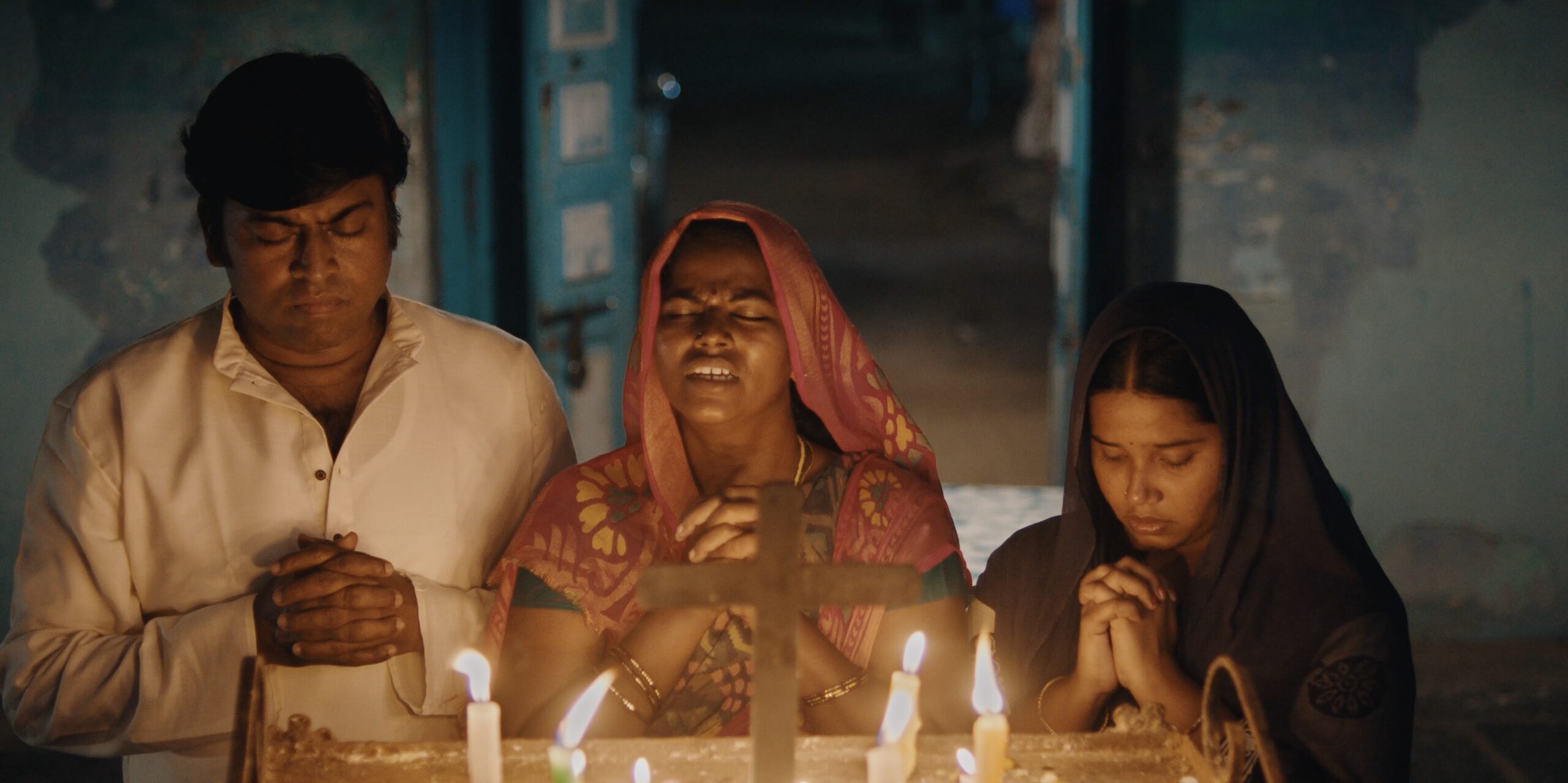[Part of Curator’s Corner, a section dedicated to showcasing work of emerging and marginal filmmakers. See here for details.]
Class, cuisine, Catholicism and climate change intersect in compelling ways in Rishi Chandna’s absorbing new work Virundhu (The Feast), set for its world premiere at the Clermont-Ferrand International Short Film Festival in February 2024. Produced in collaboration with the Krea university, Andhra Pradesh, The Feast is the first of a trilogy of films around the broad theme of water, with a focus on the sociological aspects of the relationship between humans and water systems.
A self-taught filmmaker with a professional background in advertising, Chandna honed his craft making candid, feature-length wedding documentaries for his friends. After a few years of making commercials, he chanced upon the subject of his first documentary, the widely circulated Tungrus (2017). This short, endearing portrait presents an eccentric glimpse into the foibles of human-animal co-existence. Featuring a middle-class family in Mumbai that has a rowdy rooster for a pet, the film draws its energies from the surreal sight of this rustic bird lording over the urbane surfaces of a high-rise apartment until it’s shown who’s the boss.
If Tungrus limits itself to the private realm of a cramped apartment, Party Poster (2022), in my opinion Chandna’s best work yet, is explicitly a work about public spaces. Made during the pandemic, Party Poster trains its lens on the phenomenon of civilian, group-commissioned posters erected during Mumbai’s Ganesh Chaturthi celebrations. Both an aesthetic object subject to meticulous design and densely symbolic field of signs, the poster offers Chandna a chance to examine the city’s fraught class dynamics as well as the contradictions of urban living in general. I’ve written about the film in more detail here.
The observational humour inherent in both these documentaries (which you can watch below) feeds into The Feast, Chandna’s first foray into full-fledged fiction. Set in an impoverished fishing village in the wetland region of Ennore-Pulicat in northern Tamil Nadu, the 25-minute film has two narrative strands. In the first, we follow the efforts of Mary, a woman of about forty, as she sources ingredients for a traditional fiesta she plans to throw: prawns, milkfish, mullets, mud crabs. With the area’s industrial pollution turning the waters increasingly hostile to life, and to fishing as a profession, this is no mean task. Enterprising and resourceful, Mary is obliged to search far and wide to secure her raw material.
The primary (and it turns out, the only) recipient of the feast is Thomas, an affluent politician of some power who was once a boy in the same fishing community. We understand from their interaction that Thomas and Mary were childhood friends who still maintain a cordial if somewhat formal relationship. Christmas is around the corner, and Thomas is dillydallying on an approval he is expected to give for the establishment of a cement factory in the village.
And so, the day of the feast arrives, and the local chapel – which seems both long abandoned and haunted by spectral presence – is spruced up. This place of worship soon turns into a theatrical stage as Mary orchestrates an unforgettable evening for Thomas. The Proustian repast shows him glimpses of a long-lost heaven, while the prayer that precedes it puts the fear of hell in him. The solemnity of the setting, as well as the stateliness of the compositions, are balanced by the wit and the humour of the scene.
The film calls to mind Babette’s Feast (1987), in which a lavish meal thaws the frozen spirits of an orthodox Protestant community in rural Denmark. In The Feast too, food is a repository of shared memories and values, capable of effecting profound spiritual transformation. But the emphasis of Chandna’s film is less theological than political. Mary is a curator figure, and the sumptuous variety of her menu, which has her negotiating with many villagers to get the right kind of fish, speaks of a personal touch. At the same time, it reflects an ecological crisis where the diversity of marine life is endangered by human activity. The film thus zeroes in on the precarity of an extended ecosystem: marine biodiversity, but also the ways of life around it such as food and religious traditions.
The Feast features noteworthy performances by professional actors, primarily Antony Janagi (who is a theatre practitioner) and George Vijay Nelson (who transitioned from television into cinema). But the film’s acute sense of place is entirely a product of the filmmaker’s documentary eye, which makes The Feast a very interesting alchemy of diverse approaches. An alumnus of the 2021 Sundance Screenwriters Lab and the NFDC Film Bazaar’s Co-Production Project, Chandna is currently working on his first feature, Ghol, about a penniless fisherman whose fortunes change when he makes a prize haul of a rare fish.
Bio
Rishi’s debut short documentary, Tungrus (2018), was shown at Hot Docs, Visions du Réel, BFI London Film Festival, IDFA and became an Oscar-qualifying short documentary after winning at the Slamdance Film Festival. His second short, Party Poster (2022), showed at Palm Springs International Film Festival, Krakow Film Festival, DocAviv, Glasgow Short Film Festival and others. Both films released online on New York Times’ Op-Docs. Rishi’s feature film in development was selected at the Sundance Screenwriters Lab, Cannes Film Market and Hong Kong Asia Film Financing Forum where it won the top HAF Fiction Award for a non-Hong Kong project.
Contact
rishichandna2020@gmail.com | Website
Filmography
- Tungrus (2018), 13 min., digital
- Party Poster (2022), 20 min., digital
- Virundhu (The Feast) (2024), 25 min., digital
- Ghol (The Catch) (work-in-progress)
Showcase
Tungrus (2018)
Party Poster (2022)
